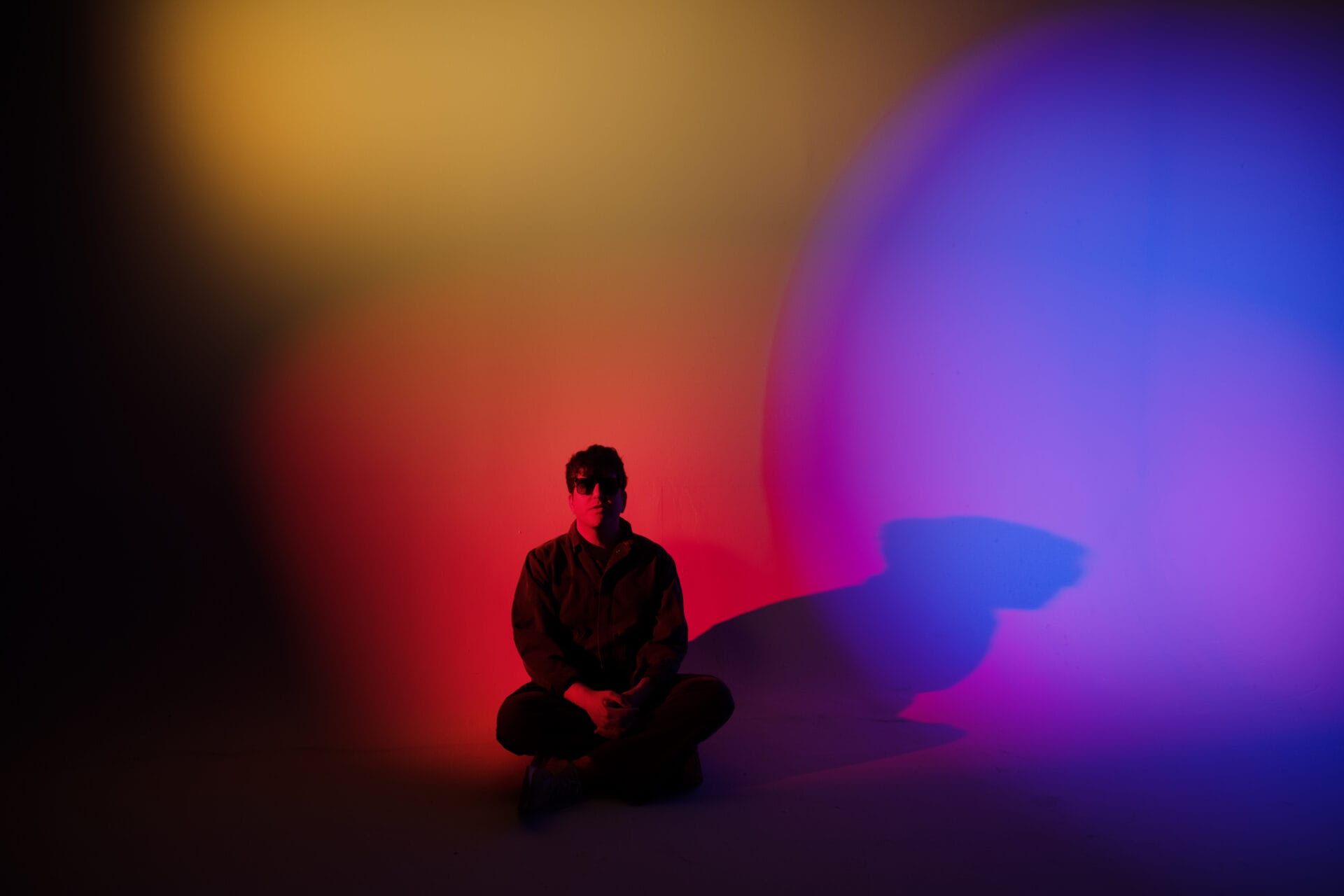Spotlight: Eric Slick

If you’ve felt anxious about how technology is mutating us all into reactive, combative, screen-glued zombies, then you are far from alone. But most of us haven’t made a deliciously fun synth-pop album addressing that anxiety. That’s where Eric Slick stands apart.
The Philadelphia native is a fixture on the drum kit—part of beloved indie-rock act Dr. Dog and collaborator of Taylor Swift, Waxahatchee, Kevin Morby and more—but Slick’s latest solo album, New Age Rage, may be the most profound contribution he’s made to our collective consciousness to date.
“If we’re going to coexist with technology, we need to maintain some humanity through it all. People are living permanently online, just constantly reacting without giving themselves a second to think,” he says, calling from his home in Nashville.
To capture that duality, Slick crafted a collection of technology-heavy pop sounds— think tweaked-out vocal samples, drum machines, synthesizers gone wild, Talking Heads-esque idiosyncrasy—to light up a set of songs that are beautifully, vulnerably human.
Slick began working on New Age Rage in 2022. He’d just wrapped up a successful tour drumming for Waxahatchee, and he felt ready to return to his own craft but unsure where to start. The spark that led to his previous solo albums, including the sweetnostalgic pop-rock of 2020’s Wiseacre, felt far off. But, once Slick enrolled in a songwriting course led by Dave Longstreth— the mad scientist behind Dirty Projectors—he felt something inside him unclench.
“I had been stuck in this phase of writer’s block, with all this stress about finances and my family’s health. [After the course,] I began to write, and I realized I was grappling with more self-doubt and anger than I’d realized,” he says. “This was much more aggressive and direct music.”
Slick invited his longtime best friend, Speedy Ortiz guitarist Andy Molholt, to be his co-pilot on the new project, and the two buds set up shop in Slick’s home studio in Nashville. Slick also co-wrote with his wife, the musician Natalie Prass, who brought in her unique pop savvy. In fits and spurts throughout 2022 and into early 2023, the duo crafted the sound that defines New Age Rage. Where Slick’s previous LPs presented fairly straightforward pop-rock sounds, he disavowed all this self-ascribed songwriting rules to build New Age Rage.
He’d already flexed his experimentalism before. On tour with Waxahatchee, Slick launched his Dayroom project— writing a song a day about mundane topics, including malfunctioning toilets at tour venues. Slick even opened some Waxahatchee and Kevin Morby dates with a set of Dayroom songs, complete with the requisite absurd costumes and props.
Back home, he took cues from David Byrne—how the singer would famously mumble vocalizations over tracks until lyrics emerged. He wrote albumcloser “Perfectionism” as a simple, clever rebuke of “all the music theory mumbo jumbo I grew up with,” he says. Nodding to Byrne’s one-chord wonder “Once in a Lifetime,” Slick’s song stays on G the whole time as he sings, “Perfectionism is a dangerous rhythm/ Caught in a loop so you don’t have any fun/ Imposter syndrome ‘til you stopped pretending.”
Slick kept making music— more open-minded and openhearted than he’d ever been before. He began writing on top of drum-machine loops instead of acoustic guitar chords. And his years as a hired-gun drummer, tinkering around in his growing home studio, gave him new technical skills to toy with.
“I thought about [The Flaming Lips’ landmark psychedelic album] Yoshimi Battles the Pink Robots. The Flaming Lips had just gotten ProTools and said, ‘Whoa, we’ve never been able to record 120 tracks for one song,’” Slick says. “We’re now 20 years removed from that album, and the technology we have is so much more powerful. Andy and I were able to burp into a microphone, sample it, resample it and turn it into a keyboard sound.”
Slick plays with the robots, so to speak, across New Age Rage—lyrically and sonically. It’s often reminiscent of peak-‘80s synth-pop, all programmed beats, wobbly keyboard sounds and chunky, slapped bass. But it was crucial for Slick to give each song a beating, human heart.
On “Freakin’ Out,” he crows “Don’t leave, don’t leave, stop freaking me out!” He wrote the tune about losing your creative muse, but the chorus feels like a desperate lovers’ spat set against the backdrop of some bright synthesizer chords.
“Ratboy Two” was written as a response to the 1986 cult film Ratboy, which is about a physically deformed boy who looks like a rat, naturally, but the syncopated chorus—“I was born different/ Who isn’t?”—can land with everyone.
By spring 2023, Slick and Molholt knew that New Age Rage was ready to roll. They’d called in about 20 friends to record a huge array of parts, including fuzzed-out guitars, saxophones, flugelhorns, congas, glockenspiels, Moog bass, organs and tons of sampled vocals and noises. (And, yes, that is an AIM instant messenger sound effect on the title track.)
“We looked at each other, knew the album was done and celebrated with bubble tea and pizza,” Slick says.
Slick took New Age Rage on tour this spring, showcasing some personally designed visuals that were locked in step with the music. He also reprised plenty of physical gags that evolved out of his Dayroom shows.
“At my core, I’m probably just a prop comedian,” he says with a laugh.
But he’s also a guy who gets this weird time we’re living through—when machines are catching up with people in every way and people are more concerned with yelling at each other online than almost anything else.
“Technology has made us become reactionary to our own detriment,” he says. “We’re living in a new-age rage all the time. And what I’m seeking is joy.”




















